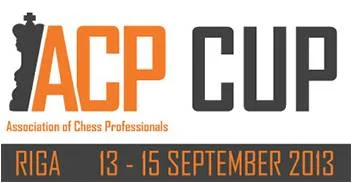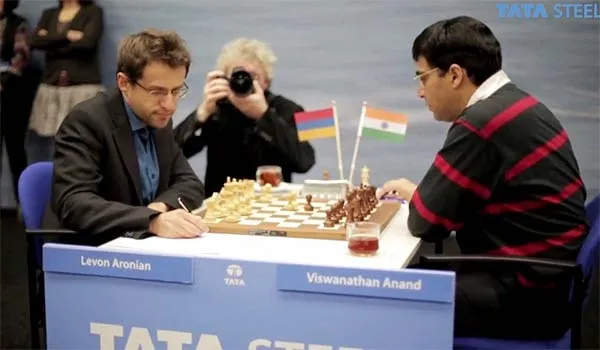17 Questions to Candidates’ Tournament 2014 Arbiter
Today I have interviewed a FIDE Arbiter Jamie Kenmure, who was officiating the Candidates’ 2014.
We have discussed many different issues of the world of professional chess such as disputes during elite tournaments, current ‘anti-doping’ regulations, no tolerance policy and so on.
***
Interview with FIDE Arbiter Jamie Kenmure

Q. How is the temperature in Khanty-Mansiysk?
A. It’s not cold here actually, +3+4 C.
Q. How is the [Candidates’] Tournament going so far?
A. You can just imagine……
Levon Aronian has lost two games. Anand is playing very strong. Kramnik was a piece down against Anand, but was able to hold a draw by a threefold repetition. Then he just blundered away some positions. That’s very unusual for him. He will play Svidler next round, so we shall see.
Q. According to ChessBase reports, Anand is going to win the tournament even though there are still 5 rounds to go. What do you think about it?
A. I think, the Tournament is over now. Anand has won it. The fight is now for the remaining places in the tournament table. That’s how I see it.
Q. How did you become an arbiter?
A. This is my first big tournament. Previously, I was officiating National level tournaments back in Australia. The selection process is done by FIDE, based on multiple criteria, one of which is the amount of work done in your zone promoting chess.
Q. What is your job as an arbiter in this event?
A. As an arbiter, you have to make sure that there are no hidden electronic devices with players or their rest rooms. You also have to see that the score sheets are properly done.
At such high level tournaments you don’t need to worry about simple rules such as touch & move etc. These are professional players, so officiating is much easier. But if there is any dispute you need to be completely 100% correct.

Q. You’ve mentioned disputes. How often do you have to deal with disputes in high level tournaments?
A. At 2700+ level of playing maybe, once during the whole tournament. It may be something like an incorrect threefold repetition claim. There was one player in this tournament (I will not mention his name) who said, most top players and even myself do not know all the FIDE rules of chess. For me it was very surprising since these players play so much chess.
Q. You know the FIDE rules so well, does it also help you as a chess player?
A. Yes, as a chess player you have to know when and how to claim a draw. The proper way to offer a draw is to make a move and then offer a draw without pressing the clock. If you press a clock and then offer a draw, you are offering it in your opponent’s time and it’s an incorrect draw offer.
Q. Is there a penalty for that?
A. OK. Most players are not going to complain about that. But if we get very technical it’s an incorrect offer.
Q. Can you offer a draw after move 1?
A. The regulations for this tournament do not allow that. Players must complete 30 moves before offering a draw. However, a quicker draw is still possible via three-fold repetition as in Anand-Aronian game (18 moves).
Q. What about ‘anti-doping’ rules for this event? All players have to undergo screening on a metal detector or something like that?
A. Absolutely. We first check the bags and then the players pass through the scanner. I want to make a special mention of Levon Aronian, who refused to enter the room until his bag was checked. He said, if we didn’t check his bag other players might suspect cheating.
Q. Do you check the bags thoroughly?
A. We just do a basic check. Players usually have water, coffee espresso or chocolate for the game.
Q. Would the metal detector catch a small electronic device?
A. A metal detector catches everything, even as small as a USB stick or a pen.

Q. What about eyeglasses, does the metal detector detect that also?
A. Strangely enough, no. With a zero tolerance policy in place we cannot delay players by checking every piece of metal.
Q. If you are even one minute late for the game, it’s a forfeit?
A. If you’re one second late, it’s a forfeit. Just imagine a soccer game starting 10 minutes late, fans would go crazy. Chess is no different, we need to be professional about it.
Q. When you are officiating in the playing area, do you actually understand what’s happening on the boards?
A. It’s very interesting to watch the games, but to understand what’s going on… it’s another planet.

Q. Judging solely by players’ gestures and emotions can you tell whose position is better or worse?
A. It’s very odd because these players are so used to hiding their emotions, you have no idea. Karjakin and Anand show no emotion at all regardless of position on the board. Topalov and Svidler are somewhat easier to read.
Q. Do players spent most of their time thinking on moves or they step out a lot?
A. Players, generally, will make one or two moves, then go to the restroom. There are exceptions of course.
Editor: Well, Thank you very much for taking your time off and giving us this interview. Do keep in touch with our readers.
Read more similar articles:
Credits:
Images used with a permission from the official Candidates Tournament site.










Comments: